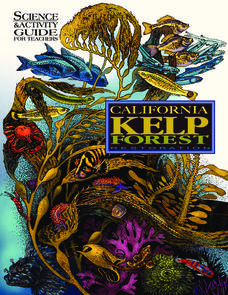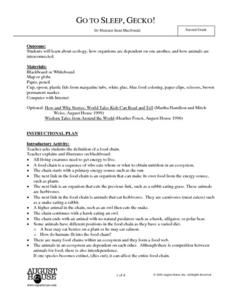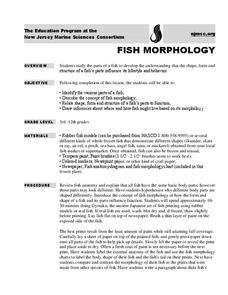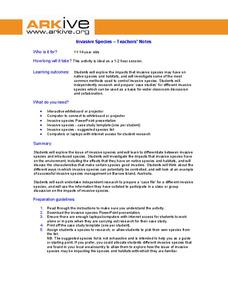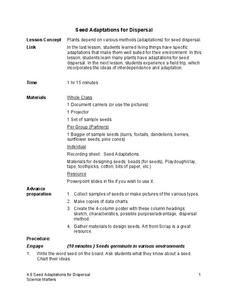Curated OER
Impervious Surfaces
Middle schoolers comprehend impervious surfaces. They recognize the problems caused by impervous surfaces. Students observe how land use can influence impervious surfaces. They chose four of the seven basic land surface, middle schoolers...
Curated OER
Water Filtration
As an example of nature's water filtering system, young ecologists conduct an experiment in the lab. They construct a funnel out of a plastic bottle, fill it with specified layers of materials that simulate layers of soil, then run muddy...
Curated OER
The Impact of Fishing
Students explore the concept of fishing as it relates to oceans and how some fishing practices can damage the health of the marine ecosystems. In this lesson on the impact of fishing, students research the many places in the world where...
National Wildlife Federation
Habitat Hunt
Put yourselves in their shoes—or, in this case, their paws. Learners assume the role of an animal and scan a habitat looking for features to fulfill their basic needs. Based on their findings, they decide if the habitat is a suitable...
National Wildlife Federation
Gator Hole Graphics
Climate changes are cyclic so how do these changes impact species that live in different habitats? Learners examine the rainfall levels in a specific swamp habitat. They also review graphical data and tell a story about how the levels...
National Wildlife Federation
Bison Mystery Box
Natural design is amazing. Young scientists connect the features of a bison to an assortment of everyday items. A bison's tail is an ideal flyswatter, and a pot stores water just like a bison's stomach. The lesson connects the usefulness...
Dawn N . Ericson
California Kelp Forest Restoration
This unit is so cool, you won't be able to "kelp" yourself! Intended for all grades, this science and activity guide for teachers offers a unique opportunity to understand kelp's role as a valuable ecological resource. Teachers and...
August House
Go to Sleep, Gecko!
A cute folktale from Bali tells the story of Gecko, Elephant, and Buffalo, and Gecko's struggle to sleep. After reading Go to Sleep, Gecko, learners focus on comprehension questions, singing and learning about geckos, building a house...
August House
Anansi And Turtle Go To Dinner
That tricky Anansi! Join him and Turtle in the story Anansi and Turtle Go to Dinner by Bobby and Sherry Norfolk, based on the African folktale. Kids answer comprehension questions and sing songs about spiders before creating spider webs...
Consortium for Ocean Science Exploration and Engagement (COSEE)
Fish Morphology
Life comes in all different shapes and sizes, and fish are no exception. Here, young scientists create fish prints as they learn how specific characteristics allow different species to survive in their particular habitats.
Cheetah Outreach
Habitats
Explore six different habitats—wetlands, rainforest, savannah, desert, city, and cultivated land—to determine which habitat factors (food, water, shelter, and space) are high, medium, or low in each. Learners also use maps of Africa to...
UAF Geophysical Institute
System Interactions: The Lorax and the Truffula Tree
If the Lorax were to write a letter, what would he write? Introduce your class to systems and feedback loops through the whimsical stylings of Dr. Seuss. Learners take on the Lorax's point of view to write a letter, among other activities.
ARKive
Species Discovery
How do you classify a newly discovered species? Learners view a presentation and complete research about biodiversity and the classification hierarchy. The lesson includes activities with dichotomous keys and work on classifying both...
ARKive
Invasive Species
Learn about how invasive species and introduced species impact the environment around them with a presentation and lesson plan. After viewing the presentation, learners go to the library and computer lab to look up various species and...
National Science Teacher Association
Middle School Sampler: Science
Focus on inquiry-based learning in your science class with a series of activities designed for middle schoolers. A helpful packet samples four different texts, which include activities about predator-prey relationships, Earth's axis and...
KOG Ranger Program
How Much do I know?
Camping trips can be so fun with the right safety knowledge. Learners take a short survey of statements about fire safety and erosion in the forest, answering true or false to each one based on their prior knowledge
KOG Ranger Program
Leading Causes of Wildfires in Oregon
You've heard of "wildfire season," but what types of weather and conditions lead to increased wildfires? Young firefighters learn about common sources of wildfires, safe ways to clear debris near their homes, and the most effective ways...
KOG Ranger Program
Managing Forests to Prevent Wildfires
Sometimes the best way to prevent forest fires is to create smaller fires. Explore forest management with an activity that explains the ways that controlled burns can keep unexpected fires from running amok in the wilderness and nearby...
Nature Works Everywhere
Fishing for a Future
Teaching a man to fish has an environmental impact. Through a series of four lessons, learners study the science of fishery management. Their study involves analyzing data to develop a management strategy for specific fish and common...
Nature Works Everywhere
Sharks and Shorelines
Examine predator-prey marine relationships through an interactive lesson design. Learners begin by studying a specific shark species and then analyze real-time shark-tracking data. They also study threats to shark populations and...
Science Matters
Blubber Gloves: It’s All About Insulation
Instill the concept of adaptation with the help of Blubber Gloves—ziplock bags, shortening, and duct tape. Scholars discuss how animals and plants keep warm in polar regions, record their predictions, and try on their Blubber Gloves to...
Science Matters
Seed Adaptations for Dispersal
After a grand conversation about seeds, adaptation, and dispersal, scholars work collaboratively to examine seeds and record their findings on a four-column chart. Small groups share their observations and further discuss seed...
Science Matters
Lotusland
It's time for a field trip! Scholars take their new-found knowledge of adaptations and seed dispersal on a field trip to a local botanical garden. They gain an up-close look at how ecological interdependence works in a distinct...
Science Matters
Matter Cycles — Sum It Up
Scholars become part of the cycle of matter with a reader's theater that showcases producers, consumers, decomposers, and the sun. A diagram and discussion concludes the learning experience and enhances comprehension.
Other popular searches
- Ecosystems and Biomes
- Ecosystems Activities
- Aquatic Ecosystems
- Freshwater Ecosystems
- Ecosystems in a Jar
- Ocean Ecosystems
- Biodiversity and Ecosystems
- Ecosystems and Art
- Underwater Ecosystems
- Populations and Ecosystems
- Urban Ecosystems
- Energy Flow in Ecosystems








